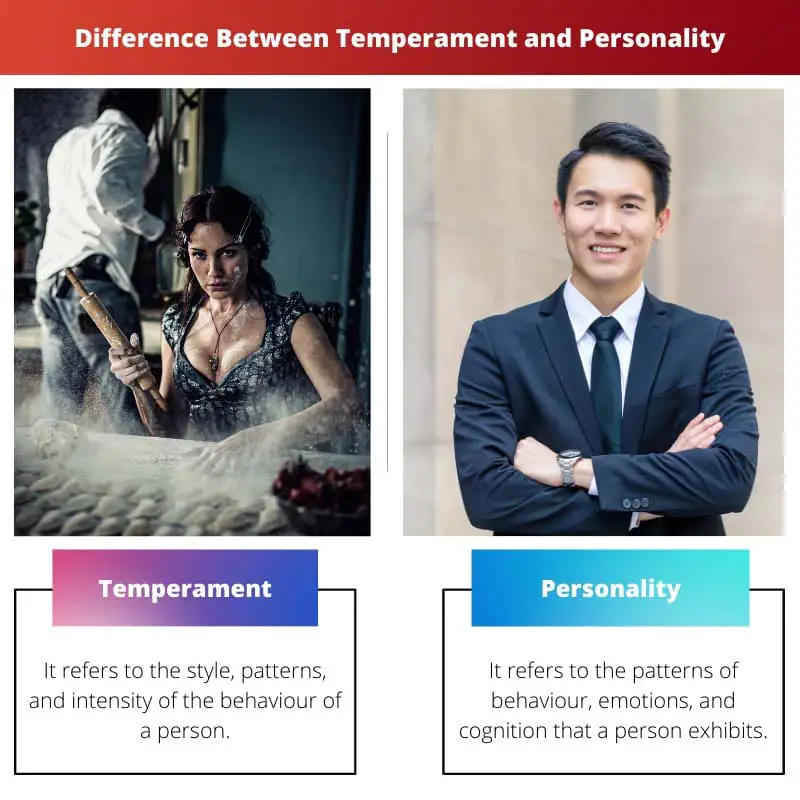Temperament and personality are two aspects of a person’s life that are related to each other in many ways. Each of them needs to be developed from an early stage with proper care.
This is because they may stick with a person throughout their life even if they turn out to be negative. Therefore, several differences between them need to be understood for this purpose.
Key Takeaways
- Temperament refers to an individual’s innate traits and tendencies, while personality refers to an individual’s behavior, thoughts, and emotions.
- Temperament is more stable and consistent than personality, which can change over time.
- Genetics influences temperament, while genetics and environmental factors influence personality.
Temperament vs Personality
The difference between temperament and personality is that temperament only revolves around behaviour and its consistent differences that are based on biological factors, whereas personality revolves around behaviour, cognition, and even emotions, which are based on biological as well as environmental factors. This also reflects the fact that temperament cannot be modified, whereas personality can.

Temperament is a broad term that refers to patterns of a person’s behaviour throughout his life. It cannot be affected by external factors and is only due to biology.
A person’s temperament cannot be learnt, modified, or adapted in coherence with different situations. However, children are able to reflect their temperament more than adults can.
Meanwhile, the definition of personality is not yet agreed upon universally. However, most people who use the term refer to the behaviour, emotion, and cognition patterns a person exhibits.
It can be influenced by a variety of factors, and a person can change and modify it numerous times throughout their life.
Comparison Table
| Parameters of Comparison | Temperament | Personality |
|---|---|---|
| Meaning | It refers to the style, patterns, and intensity of the behaviour of a person. | It refers to the patterns of behaviour, emotions, and cognition that a person exhibits. |
| Connotation | It revolves around reactions and sensitivity. | It revolves around the content of the reactions. |
| Nature | It is inherited. | It is acquired. |
| Influences | It is only influenced by biological factors. | It is influenced by environments, interactions, and even biological factors. |
| Permanency | It is permanent and cannot be modified. | It is not permanent and can be modified. |
What is Temperament?
Temperament has a very broad definition. It refers to the patterns, style, and intensity of a person’s behaviours. These are influenced only by biological factors, which means that they are inherited.
There is very little scope for them to change or modify as they mostly revolve around a person’s sensitivity and reactions, which lead to certain behaviours.
It is impossible for temperaments to be learned or acquired by individuals. It remains constant throughout a person’s life from the time of birth. Interestingly, it is easier to perceive a child’s temperament than it is of adults.
For this reason, studies regarding this concept are carried out surrounding children.
Even though biological factors only influence temperament, it affects a person’s life in many ways. It can manifest itself emotionally, mentally, and even physically.
A great example of this is when parents and their children both have a very active temperament, it is easy for conflicts to arise between them.
However, there are several things that can be understood from a person’s temperament as well. For example, a parent can make efforts to recognize patterns in their children’s behaviour.
Subsequently, they can make choices about how to react to them based on these inferences.

What is Personality?
Personality includes a person’s temperament along with other aspects such as emotions and cognitive capabilities. All these factors together make an individual’s personality.
However, it can be affected by several things. These may include biological, environmental, and even psychological factors. People can even evolve their personalities based on interactions with others.
It is relatively easier for personalities to change as compared to temperament. It is not permanent and, in most cases, constantly evolves through experiences.
Essentially, a personality is all about the content of an individual’s reactions to various situations.
Throughout history, various tests have been invented to determine a person’s personality. Philosophers and psychologists, including Sigmund Freud, Carl Rogers, Hans Eysenck and even Alfred Adler, greatly influenced these tests.
However, whether these tests provide accurate results is debatable since personality is a complex concept. Like temperament, a person can understand the personality of an individual or child through tests or even observations.
Subsequently, they can choose to react to personalities in a certain way so as to minimize the chances of a conflict.
Interestingly, many reality TV shows nowadays include people with different personalities, so conflict is more likely. This somehow seems to be more entertaining for the masses.

Main Differences Between Temperament and Personality
- Temperament refers to the style, patterns, and intensity of a person’s behaviour, whereas personality refers to the patterns of behaviour, emotions, and cognition that a person exhibits.
- Temperament revolves around reactions and sensitivity, whereas personality revolves around the content of the reactions.
- Temperament is inherited, whereas personality is acquired.
- Biological factors only influence temperament, whereas personality is influenced by environments, interactions, and even biological factors.
- Temperament is permanent and cannot be modified, whereas personality is not permanent and can be modified.

- https://psycnet.apa.org/record/1958-01355-000
- https://journals.sagepub.com/doi/abs/10.1111/j.1467-8721.2007.00505.x

The detailed explanation of the complexities of understanding temperament and personality is remarkable. The influence of temperament on familial relations and the ease of perceiving children’s temperament is particularly noteworthy.
The article effectively distinguishes between the permanency of temperament and the dynamic nature of personality. It is intriguing to consider the implications of these differences in various aspects of an individual’s life.
The main differences summarized in the conclusion provide a concise overview of the temperament and personality comparison. The information about the influences on each factor is particularly engaging.
The differences presented between temperament and personality are very clear. The distinction between the two is essential when looking at how they influence an individual’s life. The reference articles provided further insights into this topic.
The comparison table provided is a great visual aid to understand the disparities between temperament and personality. The impact of biological and environmental factors on personality is particularly thought-provoking.
The discussion on the differences in the nature of temperament and personality is enlightening. It is intriguing to note how temperament is inherited and, therefore, cannot be modified, whereas personality can evolve. This indeed reflects the complexity of human behavior.
The developmental aspect of temperament and personality in early childhood is crucial. The article does well to convey the critical role of understanding children’s behavior patterns to adapt to their temperament.
The distinction between temperament and personality in terms of their connotation and influences offers valuable insights. The reference to various philosophers and psychologists also adds depth to the discussion on personality.